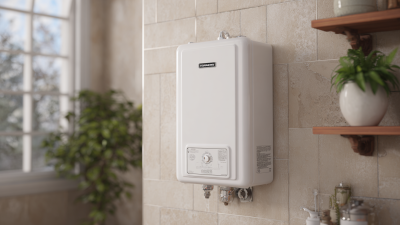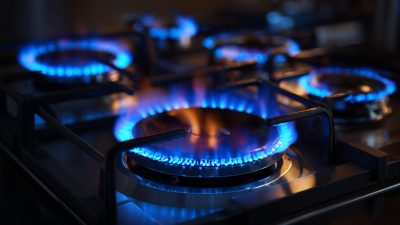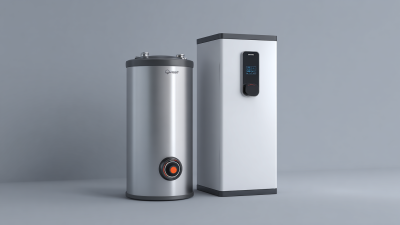
As the demand for energy-efficient solutions continues to rise, the traditional hot water heater faces scrutiny for its environmental impact and energy consumption. According to the U.S. Department of Energy, water heating accounts for approximately 18% of the energy consumed in a typical home, making it the second-largest energy expense for households after heating and cooling. With advancements in technology and growing awareness about sustainability, innovative alternatives to conventional hot water heaters are gaining traction. From heat pump water heaters to solar water heating systems, these alternatives offer a range of benefits including lower energy bills and reduced carbon footprints. This guide explores these innovative options, helping homeowners make informed decisions that align with their energy efficiency goals while ensuring a reliable supply of hot water.

In recent years, the push for innovative technologies in water heating solutions has gained momentum, largely fueled by an increase in investments in renewable energy infrastructure. Among these advances, solar heating systems have emerged as a frontrunner, adapting to diverse applications ranging from residential water heating to large-scale utility projects. Their ability to harness clean energy not only contributes to environmental sustainability but also effectively reduces operational costs for homeowners and businesses alike.

The growing market for heat pump water heaters in the United States underscores this shift. With a projected compound annual growth rate of 5.90%, these systems are becoming increasingly popular as they offer energy-efficient alternatives to traditional water heating methods. By utilizing ambient heat from the environment, heat pumps can drastically lower energy consumption, thus addressing both rising energy costs and environmental concerns. Innovative models equipped with photovoltaic technology are further enhancing performance, ensuring a steady supply of hot water while conserving resources. This evolution in water heating technology continues to redefine our approach to energy efficiency and sustainability.
When it comes to heating water, consumers have traditionally relied on conventional water heaters, which store a set amount of hot water in a tank. These units can be lengthy to heat, leading to energy waste as they continuously maintain the water temperature. On the other hand, tankless water heaters heat water on demand, providing an endless supply without the standby heat loss typical of tank systems. This not only improves energy efficiency but also saves valuable space in your home.
When choosing between conventional and tankless water heaters, consider your household's hot water needs. If your family regularly uses multiple hot water sources simultaneously, a tankless system may prove more beneficial. However, if your demand is moderate, a traditional tank model may suffice.
Tips:
1. Evaluate the flow rate (measured in gallons per minute) of tankless units to ensure it meets your household requirements.
2. Look for models with energy efficiency certifications to maximize your savings.
3. Regular maintenance can extend the life of both types of heaters; flushing the tank or descaling the unit will enhance performance.
In the pursuit of sustainability and energy efficiency, heat pump water heaters are emerging as a revolutionary alternative to traditional hot water heating methods. The global market for heat pump water heaters is projected to exhibit significant growth, with an estimated increase from $2.4 billion in 2025 to $3.63 billion by 2032, representing a robust compound annual growth rate (CAGR) of 5.4%. This aligns with the broader trend towards greener technologies that are gaining traction in various sectors, including residential and commercial heating solutions.
As awareness regarding energy efficiency and environmental sustainability grows, the adoption of innovative systems like heat pumps is expected to soar. For instance, the residential heating equipment market is projected to rise from $184.5 billion in 2024 to $424.3 billion by 2034, with a CAGR of 8.6%. Such figures highlight the shifting landscape towards low-carbon technologies, where consumers are increasingly favoring solutions that not only reduce carbon footprints but also meet their heating needs effectively. The surge in heat pump technology not only addresses energy consumption concerns but also resonates with the growing commitment to sustainable living practices.
 Solar water heaters are an innovative and eco-friendly alternative to traditional hot water heating systems. By harnessing the power of the sun, these systems convert sunlight into heat, which can then be used to warm water for a variety of household needs. This technology not only reduces utility bills but also significantly lowers carbon footprints, making it a responsible choice for environmentally conscious homeowners.
Solar water heaters are an innovative and eco-friendly alternative to traditional hot water heating systems. By harnessing the power of the sun, these systems convert sunlight into heat, which can then be used to warm water for a variety of household needs. This technology not only reduces utility bills but also significantly lowers carbon footprints, making it a responsible choice for environmentally conscious homeowners.
The mechanism behind solar water heaters is relatively straightforward. Typically, solar panels are installed on rooftops where they can efficiently capture sunlight. This energy is transferred to a fluid, which is then circulated through a heat exchanger to warm the water stored in a tank. Depending on the system’s design, homeowners can choose between active systems, which use pumps to circulate the fluid, and passive systems, which rely on natural convection. With varying designs and installation options available, solar water heaters can be tailored to fit different home styles and budgets, providing a practical and sustainable solution for hot water needs.
When considering alternatives to traditional hot water heaters, the debate often centers on electric versus gas options. Electric water heaters are known for their efficiency and ease of installation. They typically have a lower upfront cost and require less maintenance, making them a popular choice for homeowners. However, they can be slightly more expensive to operate, especially in regions where electricity costs are high.
On the other hand, gas water heaters boast faster recovery times and are generally more economical to run in areas with affordable gas prices. Yet, they require more extensive installation, including venting systems, which can increase initial costs. It's crucial to weigh these pros and cons based on your specific circumstances, such as local utility rates and installation requirements.
Tips: To make the best decision, consider conducting an energy audit of your home to assess your hot water needs. Additionally, look into rebates or incentives that may be available for installing energy-efficient models in your area, as these can help offset initial costs. Lastly, check customer reviews and expert opinions to ensure you choose a reliable brand that meets your heating demands effectively.





